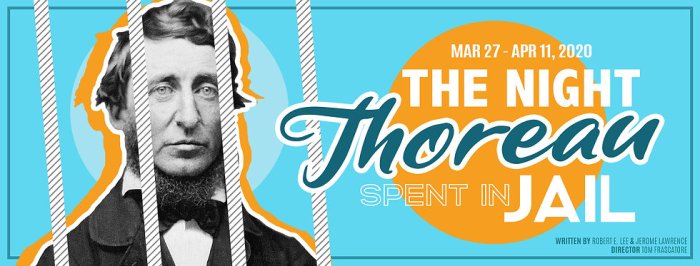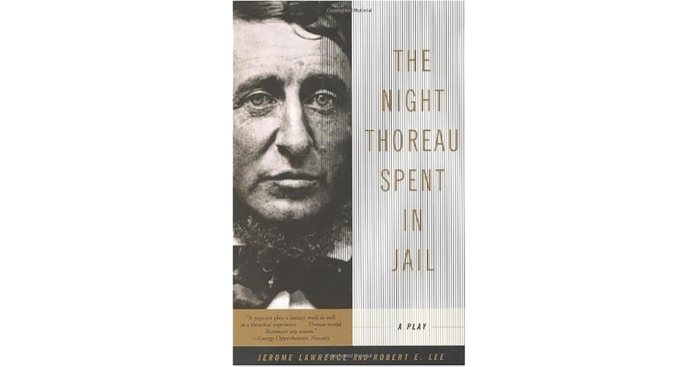Sparknotes the night thoreau spent in jail – In “SparkNotes: The Night Thoreau Spent in Jail,” we delve into the profound experience of Henry David Thoreau, a renowned American philosopher and writer, who spent a night behind bars for his refusal to pay the poll tax. Through his writings, Thoreau ignited a powerful discourse on civil disobedience, individual liberty, and the relationship between the state and its citizens.
During his incarceration, Thoreau’s reflections and observations formed the basis of his seminal essay, “Civil Disobedience,” which has had a profound impact on social and political movements throughout history. This essay eloquently articulates the principle that individuals have a moral obligation to resist unjust laws, paving the way for subsequent activists and change-makers.
Thoreau’s Arrest and Imprisonment

In 1846, Henry David Thoreau was arrested and jailed for refusing to pay his poll tax. This act of civil disobedience stemmed from his belief that the government’s support of the Mexican-American War and the institution of slavery violated his moral principles.
Significance of the Poll Tax Refusal
The poll tax was a fee levied on all male citizens of Massachusetts, regardless of income or property ownership. Thoreau’s refusal to pay this tax was a symbolic gesture against the government’s unjust policies.
Conditions of Concord Jail
Thoreau was held in the Concord jail for one night. The conditions were harsh, with cold and unsanitary conditions. Despite these hardships, Thoreau remained defiant and refused to pay his fine.
The Night in Jail

During his night in jail, Thoreau reflected on the nature of freedom, independence, and civil disobedience. His experiences inspired him to write the essay “Resistance to Civil Government,” later known as “Civil Disobedience.”
Themes of Thoreau’s Writings
Thoreau’s writings from his night in jail emphasized the importance of individual conscience, the limits of government authority, and the right to resist unjust laws.
Impact on Later Work and Activism
Thoreau’s experiences in jail had a profound impact on his subsequent work. He became an outspoken advocate for civil disobedience and individual liberty, inspiring generations of activists and social reformers.
The Essay “Civil Disobedience”

Thoreau’s essay “Civil Disobedience” was a seminal work in the history of political philosophy. It argued that citizens have a moral obligation to disobey unjust laws and that the government has no right to compel obedience.
Main Arguments and Principles
Thoreau’s essay Artikeld the following principles:
- Citizens should obey their conscience rather than unjust laws.
- The government’s authority is limited to protecting individual rights.
- Civil disobedience is a legitimate form of protest against tyranny.
Influence on Social and Political Movements, Sparknotes the night thoreau spent in jail
Thoreau’s ideas on civil disobedience have influenced numerous social and political movements, including the civil rights movement in the United States and the anti-apartheid movement in South Africa.
Thoreau’s Legacy and Impact
Thoreau’s writings have had a lasting impact on American literature, environmentalism, and social activism. He is considered one of the most influential thinkers of the 19th century.
Views on Nature and the Environment
Thoreau was a passionate advocate for the preservation of nature. He believed that humans have a responsibility to protect the environment and live in harmony with it.
Inspiration for Environmental Activism
Thoreau’s writings have inspired countless environmental activists and conservationists. His emphasis on the interconnectedness of nature and the importance of wilderness preservation has shaped modern environmental thought.
Enduring Legacy as a Philosopher, Writer, and Advocate
Henry David Thoreau’s legacy as a philosopher, writer, and advocate for individual liberty continues to inspire and challenge readers today. His ideas on civil disobedience, the importance of nature, and the pursuit of a meaningful life have left an indelible mark on American culture and thought.
Essential FAQs: Sparknotes The Night Thoreau Spent In Jail
What was the significance of Thoreau’s refusal to pay the poll tax?
Thoreau’s refusal to pay the poll tax was an act of civil disobedience, a protest against the government’s support of slavery and the Mexican-American War.
What were the main themes explored by Thoreau during his night in jail?
During his night in jail, Thoreau reflected on the themes of freedom, independence, and civil disobedience, which he later expounded upon in his essay “Civil Disobedience.”
How did Thoreau’s experience in jail influence his later work and activism?
Thoreau’s experience in jail had a profound impact on his later work and activism, as it solidified his belief in the importance of individual conscience and the need to resist unjust laws.